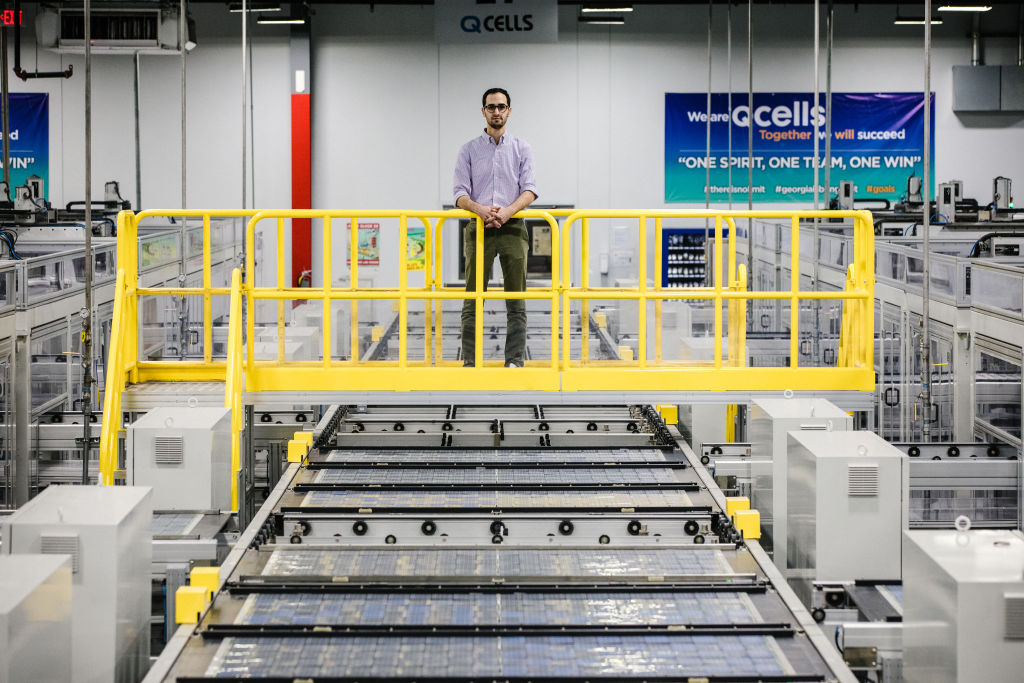Korean solar company to invest $2.5 billion in new facility in Georgia


A free daily email with the biggest news stories of the day – and the best features from TheWeek.com
You are now subscribed
Your newsletter sign-up was successful
Korean solar company Hanwha Qcells announced plans to invest $2.5 billion in building a large solar manufacturing plant in Georgia, The New York Times reports. The substantial investment boosts President Biden's efforts toward reducing America's dependence on China for solar panel supplies.
"Today's Hanwha Qcells announcement to make the largest solar investment in US history is a big deal for Georgia's working families and the American economy," Biden said in a statement, per Bloomberg. "This investment is a direct result of my economic plan and the Inflation Reduction Act."
Last August, Biden signed the landmark Inflation Reduction Act, which included generous tax credit incentives for solar, battery, and electric-vehicle manufacturing. The law is a part of the administration's agenda to expand domestic manufacturing and encourage the use of cleantech to fight climate change. The bill included $369 billion in investments in climate and clean energy programs.
The Week
Escape your echo chamber. Get the facts behind the news, plus analysis from multiple perspectives.

Sign up for The Week's Free Newsletters
From our morning news briefing to a weekly Good News Newsletter, get the best of The Week delivered directly to your inbox.
From our morning news briefing to a weekly Good News Newsletter, get the best of The Week delivered directly to your inbox.
Representatives from Qcells said that the company was making the investment in the new solar plant to take advantage of the tax credits and other incentives in the Inflation Reduction Act, per the Times. The plant will produce the necessary components for building solar panels, many of which are exclusively made in China. In recent years, dependence on Chinese solar companies has led to slowdowns in US panel installations due to COVID-related manufacturing delays, trade disagreements, and allegations of forced labor in China, Bloomberg reports. If Ocells' plans are successful, it will allow for some of the supply chains for solar energy to move to the United States. The new facility is expected to generate 2,500 jobs in Cartersville, GA, a town about 50 miles northwest of Atlanta.
"Once the plants go into full operations, the hub will have the biggest fully integrated solar manufacturing facilities in North America," Hanwha Qcells Chief Executive Officer Justin Lee said in a press briefing, per Bloomberg.
A free daily email with the biggest news stories of the day – and the best features from TheWeek.com
Theara Coleman has worked as a staff writer at The Week since September 2022. She frequently writes about technology, education, literature and general news. She was previously a contributing writer and assistant editor at Honeysuckle Magazine, where she covered racial politics and cannabis industry news.
-
 What is the endgame in the DHS shutdown?
What is the endgame in the DHS shutdown?Today’s Big Question Democrats want to rein in ICE’s immigration crackdown
-
 ‘Poor time management isn’t just an inconvenience’
‘Poor time management isn’t just an inconvenience’Instant Opinion Opinion, comment and editorials of the day
-
 Bad Bunny’s Super Bowl: A win for unity
Bad Bunny’s Super Bowl: A win for unityFeature The global superstar's halftime show was a celebration for everyone to enjoy
-
 The plan to wall off the ‘Doomsday’ glacier
The plan to wall off the ‘Doomsday’ glacierUnder the Radar Massive barrier could ‘slow the rate of ice loss’ from Thwaites Glacier, whose total collapse would have devastating consequences
-
 Can the UK take any more rain?
Can the UK take any more rain?Today’s Big Question An Atlantic jet stream is ‘stuck’ over British skies, leading to ‘biblical’ downpours and more than 40 consecutive days of rain in some areas
-
 As temperatures rise, US incomes fall
As temperatures rise, US incomes fallUnder the radar Elevated temperatures are capable of affecting the entire economy
-
 The world is entering an ‘era of water bankruptcy’
The world is entering an ‘era of water bankruptcy’The explainer Water might soon be more valuable than gold
-
 Climate change could lead to a reptile ‘sexpocalypse’
Climate change could lead to a reptile ‘sexpocalypse’Under the radar The gender gap has hit the animal kingdom
-
 The former largest iceberg is turning blue. It’s a bad sign.
The former largest iceberg is turning blue. It’s a bad sign.Under the radar It is quickly melting away
-
 How drones detected a deadly threat to Arctic whales
How drones detected a deadly threat to Arctic whalesUnder the radar Monitoring the sea in the air
-
 ‘Jumping genes’: how polar bears are rewiring their DNA to survive the warming Arctic
‘Jumping genes’: how polar bears are rewiring their DNA to survive the warming ArcticUnder the radar The species is adapting to warmer temperatures
